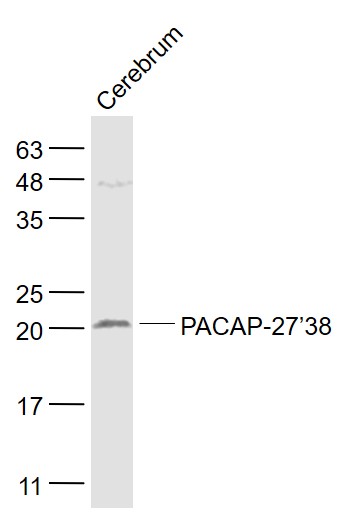PACAP-27/38 Rabbit pAb
PACAP-27/38 Rabbit pAb
- 产品详情
- 实验流程
- 背景知识
Application
| WB, IHC-P, IHC-F, IF |
|---|---|
| Primary Accession | P18509 |
| Reactivity | Pig, Human |
| Host | Rabbit |
| Clonality | Polyclonal |
| Calculated MW | 18835 Da |
| Physical State | Liquid |
| Immunogen | KLH conjugated synthetic peptide derived from human PACAP-27/38 |
| Epitope Specificity | 132-169/176 |
| Isotype | IgG |
| Purity | affinity purified by Protein A |
| Buffer | 0.01M TBS (pH7.4) with 1% BSA, 0.02% Proclin300 and 50% Glycerol. |
| SUBCELLULAR LOCATION | Extracellular region or secreted |
| SIMILARITY | Belongs to the glucagon family. |
| SUBUNIT | Interacts with ADCYAP1R1 (via N-terminal extracellular domain). |
| Important Note | This product as supplied is intended for research use only, not for use in human, therapeutic or diagnostic applications. |
| Background Descriptions | This gene encodes a secreted proprotein that is further processed into multiple mature peptides. These peptides stimulate adenylate cyclase and increase cyclic adenosine monophosphate (cAMP) levels, resulting in the transcriptional activation of target genes. The products of this gene are key mediators of neuroendocrine stress responses. Alternative splicing results in multiple transcript variants. [provided by RefSeq, Feb 2013] |
| Gene ID | 116 |
|---|---|
| Other Names | Pituitary adenylate cyclase-activating polypeptide, PACAP, PACAP-related peptide, PRP-48, Pituitary adenylate cyclase-activating polypeptide 27, PACAP-27, PACAP27, Pituitary adenylate cyclase-activating polypeptide 38, PACAP-38, PACAP38, ADCYAP1 (HGNC:241) |
| Dilution | WB=1:500-2000,IHC-P=1:100-500,IHC-F=1:100-500,IF=1:100-500 |
| Storage | Store at -20 °C for one year. Avoid repeated freeze/thaw cycles. When reconstituted in sterile pH 7.4 0.01M PBS or diluent of antibody the antibody is stable for at least two weeks at 2-4 °C. |
| Name | ADCYAP1 (HGNC:241) |
|---|---|
| Function | PACAP is a neuropeptide involved in diverse array of physiological processes through activating the PACAP subfamily of class B1 G protein-coupled receptors: VIP receptor 1 (VIPR1), VIP receptor 2 (VIPR2), and PACAP type I receptor (ADCYAP1R1) (PubMed:11175907, PubMed:23800469, PubMed:32047270, PubMed:36385145). Exerts neuroprotective and general cytoprotective effects due to anti- apoptotic, anti-inflammatory, and antioxidant actions (PubMed:23800469). Promotes neuron projection development through the RAPGEF2/Rap1/B-Raf/ERK pathway (PubMed:23800469). In chromaffin cells, induces long-lasting increase of intracellular calcium concentrations and neuroendocrine secretion (By similarity). Involved in the control of glucose homeostasis, induces insulin secretion by pancreatic beta cells (By similarity). PACAP exists in two bioactive forms from proteolysis of the same precursor protein, PACAP27 and PACAP38, which differ by eleven amino acid residues in the C-terminus (PubMed:32047270). |
| Cellular Location | Secreted. |
For Research Use Only. Not For Use In Diagnostic Procedures.
Provided below are standard protocols that you may find useful for product applications.
BACKGROUND
This gene encodes a secreted proprotein that is further processed into multiple mature peptides. These peptides stimulate adenylate cyclase and increase cyclic adenosine monophosphate (cAMP) levels, resulting in the transcriptional activation of target genes. The products of this gene are key mediators of neuroendocrine stress responses. Alternative splicing results in multiple transcript variants. [provided by RefSeq, Feb 2013]
REFERENCES
Ohkubo S.,et al.DNA Cell Biol. 11:21-30(1992).
Hosoya M.,et al.Biochim. Biophys. Acta 1129:199-206(1992).
Ota T.,et al.Nat. Genet. 36:40-45(2004).
Kimura C.,et al.Biochem. Biophys. Res. Commun. 166:81-89(1990).
Emery A.C.,et al.Sci. Signal. 6:RA51-RA51(2013).
终于等到您。ABCEPTA(百远生物)抗体产品。
点击下方“我要评价 ”按钮提交您的反馈信息,您的反馈和评价是我们最宝贵的财富之一,
我们将在1-3个工作日内处理您的反馈信息。
如有疑问,联系:0512-88856768 tech-china@abcepta.com.























 癌症的基本特征包括细胞增殖、血管生成、迁移、凋亡逃避机制和细胞永生等。找到癌症发生过程中这些通路的关键标记物和对应的抗体用于检测至关重要。
癌症的基本特征包括细胞增殖、血管生成、迁移、凋亡逃避机制和细胞永生等。找到癌症发生过程中这些通路的关键标记物和对应的抗体用于检测至关重要。 为您推荐一个泛素化位点预测神器——泛素化分析工具,可以为您的蛋白的泛素化位点作出预测和评分。
为您推荐一个泛素化位点预测神器——泛素化分析工具,可以为您的蛋白的泛素化位点作出预测和评分。 细胞自噬受体图形绘图工具为你的蛋白的细胞受体结合位点作出预测和评分,识别结合到自噬通路中的蛋白是非常重要的,便于让我们理解自噬在正常生理、病理过程中的作用,如发育、细胞分化、神经退化性疾病、压力条件下、感染和癌症。
细胞自噬受体图形绘图工具为你的蛋白的细胞受体结合位点作出预测和评分,识别结合到自噬通路中的蛋白是非常重要的,便于让我们理解自噬在正常生理、病理过程中的作用,如发育、细胞分化、神经退化性疾病、压力条件下、感染和癌症。






